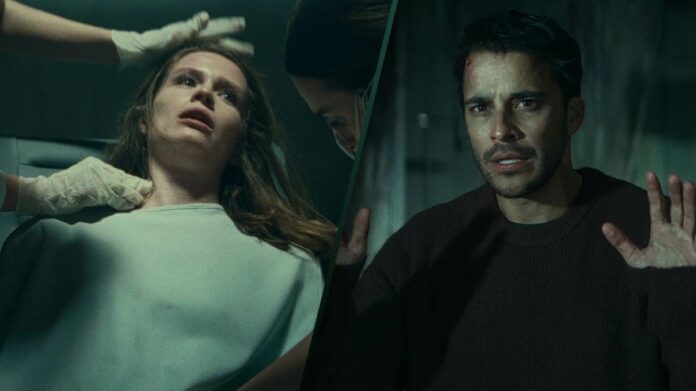The German-language film Paradise‘s opening act sets up a movie that is both mysterious and intriguing, leading us to believe we may finally have an original sci-fi mystery that’s unique in its story and made well. But instead, after 15 minutes, it follows the same old uninspired tropes and gives us no more science, only tired cliches and reversed character arcs. I mean, I was actually kind of excited by the fact that a woman leads a company that says, “Stop being ageist,” but at the same time uses the procedures that her company provides for herself to make her younger. It’s an interesting subject that could lead to so many different outcomes! In a time when big Pharma is a hot topic, people would want to eat up such content, but alas, this film does nothing new. Come to think of it, the Cillian Murphy starrer “In Time” is a movie that commodifies time and grapples with similar issues to Paradise, but both movies fail to capture the essence of the concept. Only present an overarching idea and leave it at that.
Paradise follows a man named Max, who can be considered a part of the “middle class” in this dystopian near future. Max works for the big pharma company Aeon, which rose to power by introducing the concept of “lifetime donations” to help you live your dreams. It benefited those who needed money and those who wanted to be younger. Max is one of the best employees at the company, but one-day, things take a drastic turn. His wife is forced to give away nearly 40 years of her life as payment for an insurance debt. That’s when Max has no choice but to retrace his steps at the company and see it in a new light so he can get his wife’s life back in order.
There’s a vigilante community that’s killing the people who use the facilities of Aeon, and there are copycat companies now doing the same thing Aeon is doing for much cheaper. In this world, it is as easy to give away your lifetime as it is to give away notes in the real world. Some of the tech in the new world looks cool, and the cinematography and music are pretty typical for a movie of this kind. The actors do a pretty decent job for what their roles demand, but there’s nothing extraordinary there, either. The Aeon CEO is highly underutilized, and there was just so much potential there. The old woman who plays Elaina is really good, and there are some interesting scenes with her. Max and Elaina are both a little obnoxious, and there’s nothing that they do that makes us root for them.
The movie is rather predictable from there on, and there are no crazy or unexpected twists that will catch you off guard or keep you interested in this film. Yeah, we’re already aware that we’re doomed no matter what. Climate change is brushed over as if it’s just another conversation about resolving an outfit dilemma. In a movie that is science fiction, there is very little science. It’s not that Paradise is the only film that falls into this predicament; we’ve seen it countless other times (yes, even our favorite superhero movies) because, at the end of the day, it becomes about mankind’s poor choices, our hopelessness, and chasing after a dream that is unachievable.
Maybe it’s because, as audiences, we’ve accepted this route and don’t complain enough about the lack of depth in such movies. I don’t mean that science fiction has to actually be science, but if you have an interesting concept, take us further into it. I feel like a good example would be The Martian, which is adapted from a book written by Andy Weir, who (Spoiler Alert) really tries to figure out how potatoes can be grown on Mars. Jokes aside, we’ve had some really good examples of original sci-fi movies recently that have been extremely entertaining and still existential while walking their own path. Jordan Peele’s “Nope” could be a great example. Additionally, the German show “Dark” is a show that focuses more on its mystery and may be too convoluted, but the unique take on time travel is one of a kind.
The world-building isn’t very great because the movie dives straight into the heart of the story about this one particular couple that just wants a happy ending for themselves. Out of the blue, an empathetic woman becomes greedy and switches sides with her husband. The vigilantes (again, led by a woman) have no hope; I don’t even have anything to say about them except that it’s all a big disappointment. It almost feels like there’s a personal vendetta there, but no such thing is explored. Ultimately, the script feels half-baked and a little dated, even though it’s set in the future. And after all of this, the film doesn’t end on a very happy note for most people, leaving a very sour taste in the mouth. I do understand that individualistic pursuits are a common trait in humans, but when everything else is doomed, at least the last arc should be positive.
Ultimately, Paradise isn’t worth your time if you’re a sci-fi fan. It’s not that it’s a bad film; it’s far from that; it’s just not a good one, either. A familiar tale about morals and technological advancements. There are some graphic scenes of sex and nudity, mild profanity, and a lot of violence. I’d give this movie about 2 stars out of 5, mainly for its concept and the actors.

